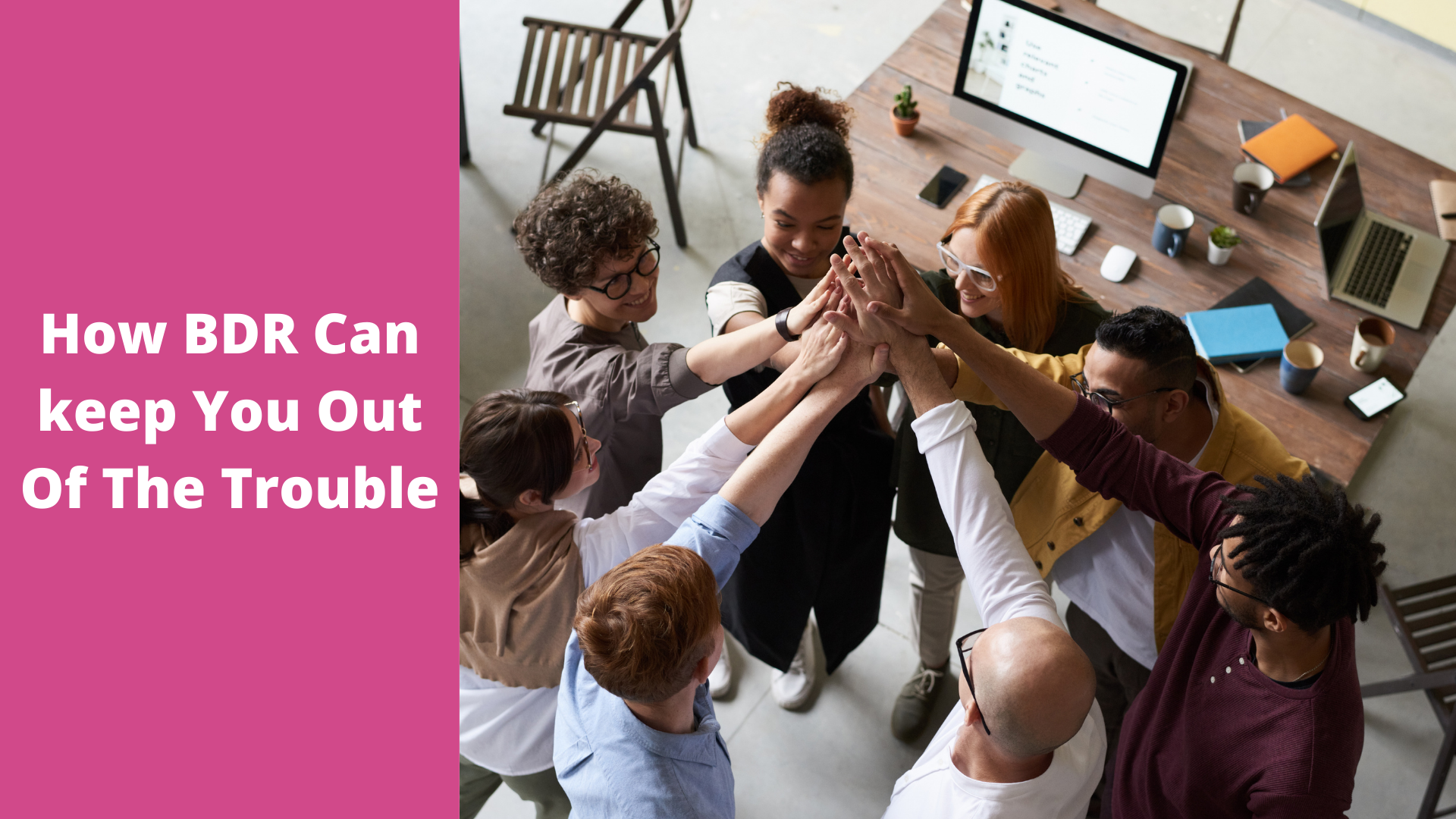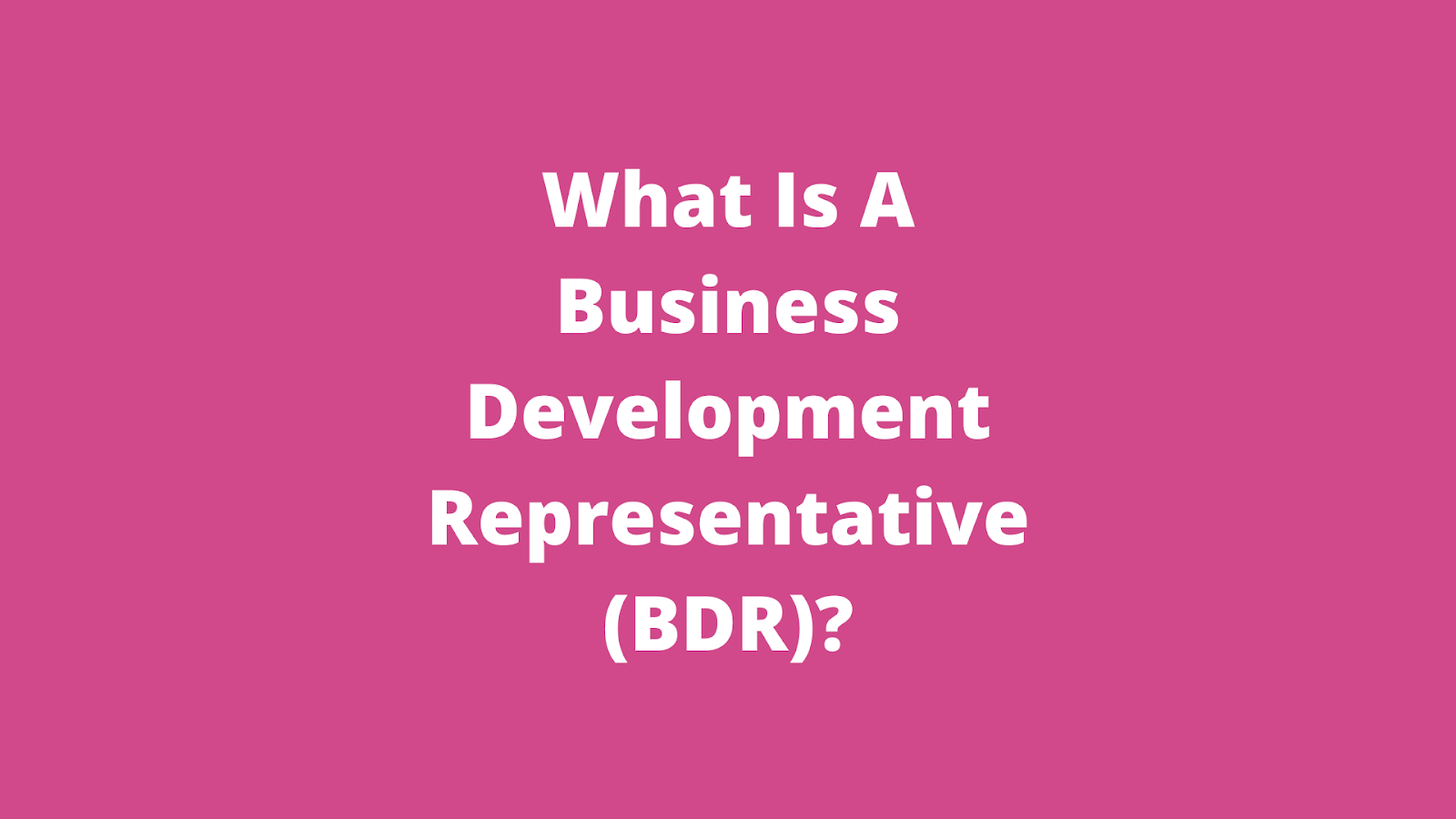A business development representative (BDR) is a person who does not work for the company, but represents it to potential clients. BDRs often play an important role in companies’ growth, especially in terms of meeting new customers and finding new markets.

As you might be already aware, there are many companies in every industry. Every company has a different target group and lifestyle of the people that it targets for its products. In order to reach those groups with their targeted goods or services, businesses rely on business development representatives (BDRs).
The role of business development representative is not limited only to helping a company find new markets so that they can expand sales even further ("first mover advantage").
Who are BDRs?
There have been many definitions of a business development representative. Most commonly stated, in general a business development representative is a person who represents the company to which he belongs, in order to build relationships and increase brand recognition.
Usually BDRs are business development managers or specialized members of sales teams; sometimes they can be employees of marketing departments as well.

But here’s what you really need to know: all companies hire BDRs so that they can improve their future prospects, grow their potential customer base (by finding new opportunities for recruitment), increase revenue and develop a better understanding among customers ("relationship marketing") — all this allows the company to realize its goals.
As business development representatives, we help companies identify new markets, gain early adopters, and build relationships. The business development representative role is not just a recruiting job. It requires the ability to listen to customers and prospects, create compelling messaging that speaks their language, and motivate people to do what you ask them to do.
This person’s role is to generate leads.
The role of a business development representative is to provide a sales force with the right customers, and then make sure they convert into paid leads. The business development representative is responsible for:
SDRs are the grunt work for more experienced salespeople in reaching out to qualified leads. Although sales development reps (SDRs) are a stepping stone to more experienced sales reps, the SDR is a crucial part of the sales process. SDRs help in reaching out to qualified leads, and make sure they have the knowledge they need to close deals. Additionally, they can help to develop a stronger pipeline of prospects.
The Sales Development Representative (SDR) is a sales team member who focuses on reaching out, prospecting, and determining whether a lead is qualified or not.
The SDRs are the grunts for more experienced salespeople in reaching out to qualified leads. Business Development Representatives (BDRs) or Sales Development Representatives are typically in charge of handling leads from the beginning.
Sales development representatives focus on determining how well someone may be suited for our products/services based on their demographics and stage of buying behavior – whether they’re already engaged with these decisions but still need guidance from us, that they don’t know anything about this yet but would like to learn more about it, etc
How can you win a game as a Business Development Representative (BDR)?
The following company representative was successful at his B2B sales job: Many BDRs end up working with the same customers overtime, which is like wearing a yarmulke for 70 years.
Corporations have several business development representative practices: cold calling and following-up on leads; setting call cutoff times to limit sales calls by corporate management; monitoring sales reps’ performance so they can be fired when underperforming or replaced if overreaching (that way you don't lose good prospects); keeping tabs on territory sales by taking periodic field visits; and canceling quota bonuses or other incentive programs that relate tobusiness development representative performance (answered too many calls? watch out).
Sales managers also frequently talk business development representatives over a period of time, but assign different quotas depending on the sales rep being evaluated.
Because they don't get credit for prospecting less-qualified leads as quantity bonus potential is based solely on actual closed deals in meetings between middle manager and accounts executives with client teams, company reps develop “bad habits.” Whether these are compensation or career management problems remains to be seen.
Many sales Reps believe a great life is selling something they don't understand! How can you fire someone as a Business Development Representative?
Other options for building your business development representative skills include: increasing your company's cyber security knowledge, including how to find and use passwords that work across servers, devices and networks; knowing how to search for an error message using T-SQL or SSMS as well as SQL Server Management Studio (SSMS); getting proficient with SQL Check constraints
Example: BDRs should know the capabilities of a table called ISNULL PRIMARY KEY without being told ; learning spri fing -- e.g., Azure, AWS and other cloud solution training; as well as essential business development representative skills include repository and transaction logs (e.g., SiteStudio or Entity Framework Logical/Physical Writer); joining a professional community of knowledge brokers sponsored by the company you work for - while they can provide good peer advice on how to prepare yourself professionally, many also remain an ego trip!
The main role of a business development representative is to make sure that the company's resources are being used in the most efficient way possible.

This person helps to develop new opportunities and offers advice on how best to use existing assets, marketing channels or sales staff. Business development representatives ensure that every channel is improved and optimized in order to generate a long-term flow of business opportunities for their employer.
Business development allows companies to take full advantage of any growth from seasonality, as well as increase efficiency throughout every department without outsourcing necessary tasks prematurely or risking exposure information unwisely revealed during meetings with prospective clients which could hurt an organization's reputation or lead it into legal trouble later down the line.
The importance of this position cannot be stressed enough; when implemented effectively, this thread will allow businesses to grow exponentially over time while keeping everything under control at all times.

1.Who is BDR(Business Development Representative)?
BDR - Business Development Representative is the name given to a person who plays an essential role in supporting two-way interaction between business and its customers/clients.
A business development representative manages, plans & executes opportunities with client company leaders by actively mingling within clients' environment so that they can provide input on new ideas, strategies and concepts as well as helping them identify needs which will become valuable assets for your clients future growth.
2.What is the role of a business development representative?
Business development representative is a Business Development Representative. A business development representative will represent the company in any business opportunity and make sure that they get the best deal possible.
There are many benefits of having a business development representative like:
3.What is the difference between an SDR, LDR and Business development representative?
An SDR is an offer which will be a short-term contract with the company. An LDR is an offer which is longer than a month but shorter than 3 years. A business development representative is an offer which lasts for more than 3 years.
4.What are the duties of a business development officer?
A business development officer is a person who manages the day-to-day activities of a company's sales and marketing departments. They typically have broad responsibilities, such as identifying potential customers, developing new products, negotiating contracts with suppliers, or providing customer service.
5.Why Do You Need a Business Development Representative?
Business development agent is designed to have the right skills and experience in order to ensure that your business's sales reach its potential. These professionals keep track of all their businesses' clients so you can get a good image during your company review, they are trying to commit customers for more than 10 years. In addition, providing better service will make many successful companies work day by day. It shows great work done for these roles SDRs , LDRs, BDR.
In conclusion, the main role of a business development representative is to promote the company's products and services to new customers. A business development representative will also be involved in marketing strategies and promoting the products or services of the company. A business development representative will also be involved in marketing strategies and promoting the products or services of the company.
A business development representative can also be responsible for other tasks, such as maintaining contact with existing clients, developing new contacts, finding new leads, etc.
BDRs may help you to promote your sales and revenue. But your business also requires an AI-based Revenue Intelligence Application to automatically generate customised real time AI predictions that can help you to get insights, recommendations and predictions from data, and much more.